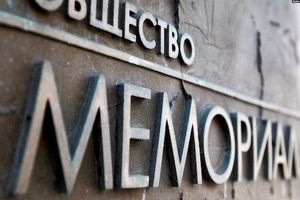Memorial: War of Memories edit

Memorial, Nobel Peace Prize 2022 shared with Ales Bialiatski, Belarusian human rights activist in prison, and the Ukrainian Center for Civil Liberties, has been witnessing since 1991 all the upheavals of civil society in Russia and its former empire. Memorial was initiated in 1987 by the dissident historian Arseni Roginski (1946-2017) whom I had defended in 1982 in different French newspapers at that time during his trial, sentencing him at the time to four years in camp for illegal work in the archives. The association was officially founded in 1989 with the support of Andrei Sakharov, Nobel Peace Prize winner in 1975, and has more than 100,000 members. The aim was to document the mass repressions in Russia. Little by little, Memorial became a true cultural institution for the preservation of memory and the rewriting of history. The awarding of the Nobel Prize is not only a reward for the patient work on the memory of the USSR over the last 30 years, but is also emblematic of the whole evolution of the post-USSR period up to the invasion of Ukraine today. In fact, it is by fighting a certain overused conception of official Russian history, invoking the denazification of Ukraine to destroy it, that the banned work of Memorial takes on its full meaning today.
Divergent interpretations of history
The writing of history is not based on a single critical reading of documents or facts, but serves to rehabilitate a new conception of history from below, that of these millions of anonymous and excluded from history. Memorial thus made it possible to find and index the names of the 2,614,978 victims of the Gulag, and then developed a more militant conception of history, mobilizing a hundred or so active networks in the regions, to publish classified documents on Stalinism. It collects the testimonies of families and victims of the camps, provides them with legal assistance, leads debates throughout Russia, develops projects for museums or places of memory, distributes publications or puts them online. The stakes are both political, but also identity-related, in contradiction with a nationalist history, which was promoted after the arrival of Putin in 1999. This debate on different new interpretations of Russian and Soviet history plays a fundamental role in the formation of a new political culture in Russia, divided between liberal and nationalist visions. For example, knowing whether the 1917 revolution, a founding event of the USSR until now mythologized, appeared as a breaking point imported from the West or whether it should be part of the continuity of an imperial Russia... etc. After 2000, the Putin government, divided on these interpretations, switched to the instrumentalization of a patriotic and anti-Western history, supported by the Orthodox Church, magnifying the symbols of tsarism without touching those of Leninism, its gravedigger. The Soviet anthem was restored with new lyrics.
The work of Memorial will then try to decipher a whole series of myths maintained by the legacy of Stalinism, from the great terror of 1937 to the German-Soviet pact in 1939. This period becomes another point of cleavage on the interpretation to be given to the Great Patriotic War (1941-1945) which minimizes the German-Soviet pact, the annexation of Eastern Poland and the Baltic countries. With the second Chechen war (1999-2009), marked by more than 200,000 victims, the work becomes more political when Memorial investigates with other NGOs on all the Russian exactions to defend the human rights violated by the Putin regime. For having investigated this war, a number of journalists were murdered, including Anna Politkovskaya on October 7, 2006 in Moscow and Natalia Esterimova, head of Memorial in Chechnya, on July 15, 2009 in Grozny. In solidarity, the European Parliament awarded Memorial the Sakharov Prize in October 2009 for its contribution to "freedom of thought". But at the same time the vice is tightening against this acquired freedom while the Putin power is trying to impose new positive visions of Stalinism as a major contribution to the modernization of the country and its unification. Stalin's role in the terrors is watered down in favor of that of a warlord. A number of media programs will attempt to rehabilitate him, while various Gulag memorial sites will be closed.
Facing official history
The rereading of the history of subjugated or punished peoples obeys a war of memories. For example, the short-lived independence of the democratic republics of Ukraine (1918-1920) and Georgia (1918-1921) was always denied in the name of conflicting representations of this past. The concern remains to rewrite a single official version of a common national history serving the interests of Russia in its relations between center and periphery. All the more so since this national narrative, based on what has not been said, should allow the idea of a single Russian Empire to be rehabilitated. Eluding controversial themes and ignoring the production of critical knowledge translated into Russia over the last 25 years, school textbooks are now rewriting themselves for the benefit of patriotic and military rhetoric. History then becomes a means to legitimize a posteriori, yesterday in Georgia as today in Ukraine, Russia's military interventions and to justify the forced appropriation of territories claimed in the past. With the war in Donbass and the annexation of Crimea, Russia adopted in April 2014 a memorial law "on the historical memory of the Second World War", criminalizing the dissemination of false information.
Memorial has gradually become in this critical context, an obstacle to all revisions of official history. Already in December 2008 its headquarters had been searched in St. Petersburg and many of its archives were confiscated. Finally, in November 2012, a new law against "agents of foreigners" was enacted, recalling some of the terms of the Great Terror of 1937. Any NGO likely to receive donations from abroad falls under the blows of this new liberticidal law. Harassed and finally judged illegal, its liquidation was pronounced by the Moscow prosecutor in December 2021, its offices were seized and closed, while in Karelia the historian of the Gulag, member of Memorial, Yuri Dimitriev, was sentenced to 15 years in a camp.
Reminiscent of other trials in Moscow in the 1930s, Memorial is banned because: "It falsely portrays the USSR as a terrorist state, makes us repent of our Soviet past instead of recalling our glorious history." The identity of the New Russia must above all be built on the heritage of this allegedly glorious past, including that of the 26 million deported to the Gulag. More than ever, by controlling historical memory and interpreting the past, Putin has been asserting for 20 years this last prerogative of Russian power to claim to rewrite history. With the recognition of this Nobel Peace Prize, Memorial has been able to set itself up as an instance of resistance, recalling the historical and international dimension of the Gulag as well as the renewed fight against totalitarian terror. In spite of the leaden blanket, a virtual museum of the Gulag was able to develop (museum.memo.ru), while abroad the Memorial networks have taken over. Memorial strives to keep a certain ethic of unsubdued history in the face of an obscured memory.
Did you enjoy this article? close





